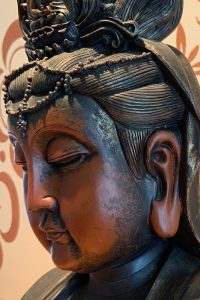
By Rev. Marcos Sawada
A confession: I’m more a speaker than a listener. Are you a good listener? Many people are not.
Generally, I think people like to talk more than listen. That’s strange, given we have two ears but only one mouth. Mouths have two functions which keep them busy—speaking and eating. The job of ears is merely to hear. So why is listening so difficult?
Listening requires our attention. Even if we’re talking we need to listen, to respond to other people, to answer questions, and so forth. We obviously need ears. As with over-eating, over-talking is bad for us, especially in our society. “Everything in moderation” is a good rule to follow.
If we really want to learn, however, we must listen carefully.
In Jodo Shinshu, our most important and primary “practice” is “listening.” We must listen and understand. Shinshu teaches a deep, transformative kind of listening, called in Japanese, chōmon (聴聞). Another word in Japanese is monpō (聞法), which means listening to the Dharma, the Buddha’s teachings. Listening seems simple but tricky, because it’s a silent skill requiring a mental process of attention. Another problem is that we tend to listen selectively, filtering what we don’t like, and focusing on what’s pleasing and agreeable.
Shakyamuni Buddha awakened to great truth because he learned from teachings of past Buddhas when he questioned the nature of his anxieties and attachments. His experience was transmitted through words over time to Master Shinran, who realized the importance of listening to teachings received from history, tradition, teachers, and others he encountered. He grasped how understanding and accepting the Truth of non-dualism–the world of Oneness–was the path to transcending the world of samsara, the ups and downs in life. Human words are defined in dualistic terms, such as life and death; past and present; you and me. Non-dualistic truth transcends human words.
This process of hearing/listening and truly understanding I think is the meaning of shinjin, deep entrusting or faith. Only by listening can we transcend the world of samsara, the cycle of birth and death, the world of dualism.
Master Rennyo spoke the following words more than 500 years ago, explaining to Shin Buddhists how to listen and hear with one’s heart:
- You should listen as if you’re listening for the very first time. This should be our attitude when listening. Even if you heard the same words before, they are never the same. All things change, everything is impermanent: you, the speaker, the words. Learning from the Buddha’s teaching is similar to smoking meat. The smoke gradually infuses the meat with flavor. Likewise, the more you hear the Buddha’s teachings—even if you don’t understand—the dharma gradually becomes part of you, penetrating your body and mind. Listening once, you may understand a certain meaning. How much deeper the meaning if you listen a thousand times?
- Listen as if the message is for you alone. Listen to the Buddha’s teachings because you seek understanding about your anxieties and suffering. No one can eat or breathe for you. Others cannot take medicine for your sickness. You may say, “This teaching is good for my husband, my son, or others.” This is not how to think. The teachings are for you alone. They are the path to your awakening.
- Listen as if it’s the last time you’ll hear the teachings. “Last time” means no second chance. We only live moment-to-moment. The past will never return. If you die, you’ll never again listen. Now that you’re able is the time to listen. Remember, conditions change, everything changes, nothing stays the same. Contemplate your concerns, anxieties, and passions and seek answers. Don’t wait until tomorrow or the next day, or think now is not my time. We don’t know if even the next moment will come or not. Every time is the first and last time! Everything you need is here now!
Listen to the Dharma! Namu Amida Butsu.
-Rev. Sawada recently became resident minister of Kaneohe Higashi Honganji in Oahu, Hawaii. Previously he was the minister of Hilo Higashi Honganji.

